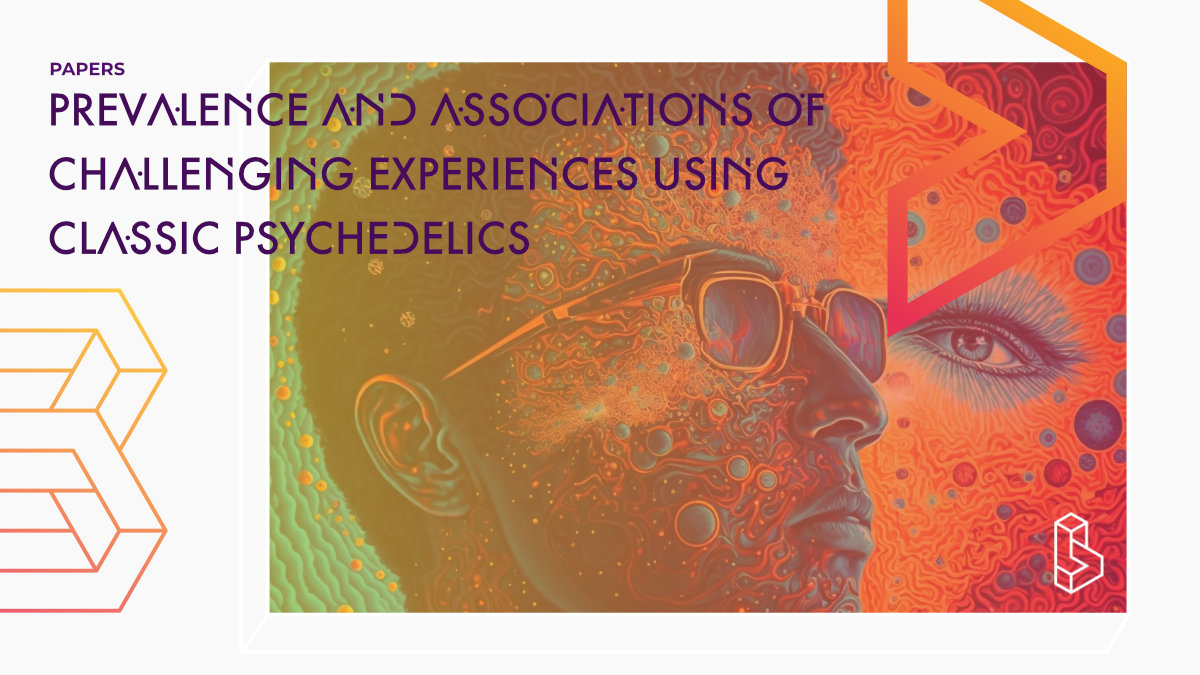This survey study (n=2822) examined the prevalence and associations of challenging, difficult, or distressing experiences using classic psychedelics in a subsample of respondents (n=613) who reported lifetime classic psychedelic use. Of those, 59% indicated no challenging experiences, 9% indicated having a difficult experience lasting more than one day, and 2.6% reported seeking medical/psychiatric/psychological assistance.
Abstract
“Previous studies have investigated challenging, difficult, or distressing experiences using classic psychedelics, but little is known about the prevalence and associations of such experiences. Using nationally representative data of the US adult population (N = 2822), this study examined the prevalence and associations of challenging experiences using classic psychedelics, in a subsample of respondents who reported lifetime classic psychedelic use (n = 613). Of the 613 respondents who reported lifetime classic psychedelic use, the majority of them (59.1 %) had never had a challenging, difficult, or distressing experience using a classic psychedelic, but 8.9 % of respondents reported functional impairment that lasted longer than one day. Notably, 2.6 % reported seeking medical, psychiatric, or psychological assistance in the days or weeks following their most challenging, difficult, or distressing experience. In covariate-adjusted regression models, co-use of lithium, co-use of other mood stabilizers, and six set and setting variables (no preparation, disagreeable physical environment, negative mindset, no psychological support, dose was too large, major life event prior to experience) were associated with the degree of difficulty during respondents’ most challenging classic psychedelic experience; and co-use of lithium, co-use of other mood stabilizers, and three set and setting variables (negative mindset, no psychological support, major life event prior to experience) were associated with overall risk of harm. In summary, this study provides insight into the prevalence and associations of challenging, difficult, or distressing classic psychedelic experiences. The findings broadly correspond with findings from previous studies and can inform harm reduction efforts and future experimental research designs.“
Authors: Otto Simonsson, Peter S. Hendricks, Richard Chambers, Walter Osika & Simon B. Goldberg
Summary of Prevalence & associations of challenging experiences using psychedelics
The evidence suggests that serotonin 2A agonist classic psychedelics such as psilocybin have a good safety profile and may be effective in treating certain psychiatric disorders when combined with therapy. However, little remains known about the potential risks associated with classic psychedelic use. The long-term effects of the acute classic psychedelic experience are not well-understood, but previous research suggests a higher risk of harm to oneself or others. The prevalence of challenging, difficult, or distressing experiences using classic psychedelics is higher in naturalistic surveys than in laboratory studies.
The authors used a subsample of 613 lifetime classic psychedelic users from a representative sample of the US adult population to conduct exploratory research on the prevalence and associations of challenging, difficult, or distressing experiences using classic psychedelics.
Study details
Topics studied
Population Surveys
Study characteristics
Re-analysis
Survey
Participants
2822
Humans
Authors
Authors associated with this publication with profiles on Blossom
Otto SimonssonOtto Simonsson is a Postdoctoral Research Fellow at the Karolinska Institute where he conducts research on meditation and psychedelics. Otto held a similar position at The Centre for Healthy Minds at the University of Wisconsin-Madison.
Peter Hendricks
Peter Hendricks is a Professor in the Department of Health Behaviour at the University of Alabama. Hendricks's area of expertise lies in substance abuse treatment and prevention.
Institutes
Institutes associated with this publication
Karolinska InstitutetKI is Sweden’s single largest centre of medical academic research which as expanded into the field of psychdelics.

